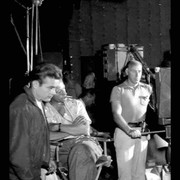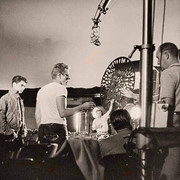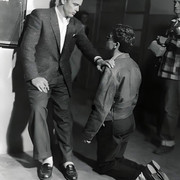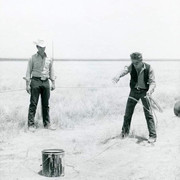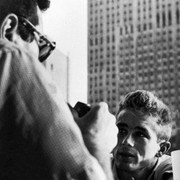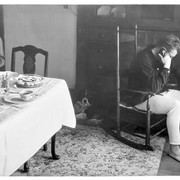| Главная » Статьи » ИНТЕРВЬЮ |
Интервью с Джоном Гилмором, 1 часть (англ.) | |
PW: What prompted you to do a second book on James Dean, and how long from conception to fruition? JG: Donald Spoto interviewed me at length for his book, REBEL, which prompted me, after so many book interviews (from Joe Hyams to Paul Alexander, etc., and of course, Val Holley, a friend I met through James Sheldon) to write a second book on Dean.My first book, 1976, was short and "safe," so to speak, my intention had been to write about the person that he was, not about the movies or Indiana (the typical bio fluff), but to attempt, from what I knew first-hand, to give a more rounded-out and truthful picture of who he was, rather than simply pumping out more fodder for movie magazine-minded myth-makers. PW: Both books appear to have a number of pseudonyms. Has enough time passed that any of them can be revealed now? JG: They contain a few pseudonyms, but you'd have to ask about someone in particular. PW: Karen Davis, the aspiring actress who was believed to be pregnant by
Dean at the time of his death. At the end of Live Fast, she talks about moving
to
PW: Don Manfredi. I may have him mixed up with the above. JG: No, Don Manfredi was his real name. Artist and Broadway set designer. PW: Bill Smith, an actor you mentioned early on who tried to put the make on you. He went on to star in a Clint Eastwood movie. Dean laughed at Smith's handshake grip, i.e., something about Smith jacking off with the same grip. JG: Bill Smith is his real name (billed as William Smith). Check IMDB for him: lots of pictures. Eastwood movie was "Any Which Way You Can". Bill starred with Eastwood. Was a friend for many, many years. Has had a hard time of it - substance abuse. Last we talked was ten or so years ago. He had a son in prison on drugs (son was pals with Brando's kid in the jug). PW: You concluded chapter PW: There are quotes from Stewart Stern throughout your Dean writings.
When did you meet him and will you agree that he was probably closer to Dean
than most people? JG: I met Stewart through Jimmy during the making of REBEL. Stewart and
I became friends later, after Jimmy's death, ran around quite a bit together
and talked about Jimmy a lot. I can't say he was so close to Jimmy apart from
the REBEL making; even then Stewart wasn't like on the set as it were. But
Stewart had friends that Jimmy became friends with, meeting through Stewart. I
liked Stewart very much and haven't seen him in years. Last time we talked was
in the early '80's, and he'd married the dancer and moved to PW: In your Hollywood memoir Laid Bare, Janis Joplin asked you if
Jimmy was 'queer'. When did speculation about Dean's sexuality by the general
public begin? I did not think that kicked in until after PW: William Bast will be publishing a second book on Dean in a few months. He promises to tell all that "the law and his faint heart wouldn't permit" him to reveal in 1956. Any thoughts on his first Dean bio and what he plans to publish this time? JG: Bast and I have been at odds for personal reasons dating back to the mid 1960's. I had no interest in his first book nor will I for whatever he's drumming up now. In my opinion, Bast has one interest: how much to squeeze out of something (as he did with the dreary, make-believe TV movie about Dean he did). I am sure it will be exploitive, critical, self-serving and a make-believe hodge podge of rehashed fact. PW: In Holley's superb bio of Dean, you are quoted about a relationship
you believed Jimmy had with a Hollywood high school boy, an actor and dancer,
whom you and Dean were both very taken with. You said, with certainty, that
something had to have happened between them during the summer of '55.
Comment? JG: OK, real personal stuff. The boy's name was Hooper Dunbar. He attended
Hollywood High at the time. He was into poetry and art and music, and studied
modern dance. We'd had an exploratory relationship over which he felt very
guilty and troubled. He was Sally Kellerman's young cousin, and I'd already had
a fling with Sally (and again later in '60) and she gave me a really bad time
about having "ruined" her cousins life. Earlier, he'd wanted to meet
Jimmy and so I took him on the bike I had to Jack Simmons place off Sunset, and
after a short time Jack showed up with Jimmy (they were driving the hearse Jack
used to tote Vampira back and forth to the TV station). I introduced Hooper to
Jimmy, and Jack later told me Jimmy said the boy was like a "tomboy Jimmy
Dean". The boy later told me he'd met Jimmy again because he'd gone to
Warner's and then Jimmy took him to dinner. At that time, Jimmy was spending a
lot of time at Jacks as he didn't want people going to his place up off the
Strip. I can't give details about what might have gone on between them, and you
haven't asked for details about what happened between the boy and myself. PW: Do you still own personal items of Dean's, such as the leather jacket you're pictured with in a news photo in your first Dean bio, The Real James Dean? JG: No. After a divorce from my first wife, in '77 (I think), I purged and sold many things I owned. I have been mobile so much of my life (LA to NY, and NY to LA), I just haven't kept things - or people. I do have an original poem he wrote, typed out, but I don't have anything else. Most all gone like the three wives, three lives. I do have the pictures Jimmy took of me. A couple have been published a few times, but one has never been used anywhere. PW: David Dalton said recently that, during his research for The Mutant
King in the early '70's, he encountered numerous gay-oriented stories about
Dean, but declined to either attempt corroborating them or include any of it in
his book. Basically, he expressed sincere doubt as to their validity. He also
believed that to acknowledge that aspect would completely undermine the book
and turn it into a homosexual perspective or study. Any thoughts on his
approach in The Mutant King? JG: Yes. As an early Dean book, PW: Of the three films, and the TV work you are familiar with, what
performance by Dean, in your mind, comes closest to the Jimmy you knew? JG: I'd have to say REBEL, because there are moments in the film when as he was
comes right across, like steps out of the role in the movie and there he is.
Also, a documentary about him racing and he's talking as they walk. That's what
Jimmy was like. PW: Would you say, given your disposition at the time, of being years
younger than Dean, similarly photogenic and a struggling actor, Jimmy's
behavior was specifically geared toward machismo and bravado that he intended
to impress you with? In other words, one misanthropic rebel trying to impress
another? JG: There was a part of that involved, yes. But it wasn't so much that I was
younger because by experiences and having-been-around raise the ante in the
game. Born in PW: Was writing The Real James Dean and Live Fast, Die Young a sort of
sporadic, twenty year therapy, that, in the end, put your whole relationship
with Dean in the proper perspective? JG: Wow. You've got some good questions. After I wrote the first
book - which sold 160,000 copies, I never intended to write another one about
Jimmy. However, the world changed, and as I said, I was doing lots of
interviews for books and documentaries, and I finally said they're missing the
point. They're writing books-for-bucks like toys-for-tots, and how do you eat
the orange without peeling the skin? How do you get at the pearl without
busting the shell? I knew if I died suddenly there'd be things nobody'd ever
know; small things about a human being that are deep in that being - the seeds,
as it were, within the orange; the endocarp within the peach. My concern was
always to go to the heart of the matter, doing that without even knowing that's
what I was doing - far back like when I started PW: The revised edition of Live Fast, Die Young will have a
different title due to your belief that the original was stolen. Any advance
word on what the new title will be, and how was PW: Joe Hyams claimed in his Little Boy Lost book that the Rev. James DeWeerd revealed that Dean and DeWeerd had a sexual relationship beginning while Jimmy was still in high school, continuing off and on for several years. Needless to say, that was the biggest bombshell to hit Dean circles in years, causing a huge uproar, and a total rejection of Hyams claims by most fans and, of course, 'The family'. You mentioned DeWeerd in a compassionate light early in Live Fast, implying that recent biographers had somehow victimized and misrepresented him. Those detractors who dismiss your Dean works as sensationalism are overlooking the fact that you did not jump on the DeWeerd/Dean sexual bandwagon. Could you comment on the differences in your handling of that aspect and how Hyams dealt with it? JG: Everyone is always climbing all over one another looking for a ‘bombshell'. Reminds me of a bushel of rats grabbing at cheese. The differences in Hyams approach to the subject of DeWeerd and my take, is that I was concerned about the human elements involved in DeWeerd's understanding of the ‘gaps' in Jimmy's life and in some way attempting to give Jimmy the support he so seriously needed.. People look at pictures of Jimmy and see the smiling country boy but fail to even glimpse the pending storm brewing in a troubled soul. It was this area that DeWeerd attempted to focus upon; if it came to a point of offering physical support, then that's what happened. Joe Hyams made lots of claims in his book -- lots and lots of claims, Paul. PW: Alexander's book on Dean has been completely crucified by the conservative right of the Dean scene, as well as deified by some of the gay community. It is referred to by many as The Gay James Dean Book. Would you agree that ‘Boulevard' has a glaringly biased approach that illustrates an obvious gay agenda, in other words, Alexander's main thesis was to MAKE DEAN GAY once and for all? Please comment on Alexander's gay anecdotes as well as your belief that you were seriously misquoted in his book. JG: Alexander's book was rightfully crucified by the right as well as most of the left, except as you point out, the gay community. His ‘gay' anecdotes are without merit, are offensive, and clearly manufactured without the least attribution. Alexander did the same thing with the Sylvia Plath book; just jumped right off the pier into fantasy. I know that Alexander was in the process of getting a divorce when he interviewed me, and he was most interested in all the homoerotic aspects which I did not divulge in the details which he added to his book. I won't get into specifics. I think Alexander's own sexuality crept into his book and, like much of Ellroy's writing, he seems to have gotten off on it. He made scenes that were intense and erotic into ‘smut' and ‘dirt' which is in line with much of Alexander's ‘gay anecdotes'. PW: What became of Dean's belongings that were stolen from the PW: Leonard Rosenmann has said that Jimmy was violent and uncontrollable
when he (Dean) drank. There are other anecdotes in recent bios, from some of
Dean's classmates at UCLA, that he was a mean drunk and would actually beat his
girlfriends when loaded. Live Fast contains one such episode where Dean knocked
a girl out cold outside a club. Rosenmann contends that Pier broke it off with
Jimmy because she had simply had enough of being beaten up when Dean drank. Any
comments about Dean's drinking?Dean once crashed a party at the Rosenmann's
and, very loudly in front of mixed company pointed out that Lenny had been
having an affair with Lois Smith, an actress on East of Eden. Although Lenny's
wife, Adele, had already found out about the affair, I believe this scene set
the stage for Rosenmann's later claims of Dean being "drunk and
disorderly, and I (Lenny) guess I had just outgrown that sort of thing".
omment? JG: Dean did a lot for Lenny Rosenmann. It is my
personal belief that Jimmy put Lenny on the map. Jimmy wanted more out of the friendship -- wanted to run around, fart around
with a basketball (play ping- pong as we did a couple times); wanted more than
Lenny was willing to give. Lenny has or had the attitude that Dean clung to
him, wanted attention, thus annoying Lenny who said, "I'm not your father!
Go play basketball with your father!" I know Rosenmann hurt Jimmy's feelings
and if the story is true about Dean blabbing about screwing Lois, then it is
because Jimmy was jealous of the attentions Lenny was paying to Lois, 'Miss
Nobody' at the time, and one of Kazan's brilliant casting moments (that maybe
few realize). Jimmy couldn't hold much liquor. I didn't see him getting
violent; more like sloppy and falling around. Skip E. Lowe, who had a TV show, was together two or so times with
Jimmy, myself, and once with Shelly Winters in a bar in PW: Do you think Jimmy had the potential to be a violent spouse, i.e. a wife beater? In Live Fast, you wrote that Karen Davis had confided to you or someone else that Jimmy had gotten angry and hit her a few times. JG: He did hit her. I saw the bruises. I can't answer what he hypothetically might have become. If he'd drank a lot and used drugs he might've been nasty -- punched people around. I didn't see a VIOLENT temper in him; people get that from the movies he made; like so-and-so's a tough guy when actually a midget could kick his ass. Jimmy had a streak and become very depressed, very anxious -- disturbed. I think if you rubbed him the wrong way at one of those times or CROWDED him, he might've knocked you out of the way. I know he did with someone else -- a mutually involved person, and that was the end of the relationship. Jimmy didn't know all the shit he had going on inside of himself, and as is the case with so many ‘stars' the fame can only seem to compound the disturbances at times. (This is what happened to Marilyn Monroe ALWAYS!) Jimmy's sense of being couldn't handle rejection. PW: This is kind of an extension of the earlier question about Dean and Rosenmann, and the affair that the latter had with extra, Lois Smith. It's been speculated that Dean felt strongly about the sanctity and concept of marriage, and therefore blew the whistle on Lenny and Lois because he strongly disapproved of their liaison. Did Jimmy ever comment to you on his views regarding marriage? JG: Jimmy's feelings about marriage were basic with what we all had been conditioned to feel: it was a sanctity- the ultimate; love, kids, the little or big house with the two cars and insurance policies and live in the roses. One thing I have to say and this is very clear in my head because we talked about it once: you didn't fuck someone else's wife. If you did, you were a worm- you weren't a man. PW: What do you remember about Dean's friend, actor and artist Billy Gunn?
Is there a story behind the paintings Jimmy did of him? JG: I knew Billy Gunn via Jimmy and Marty (Landau), and was friendly with Billy
in ‘56-’57 etc. in PW: We previously talked about Liz Sheridan and her memoir on Dean.
You commented that after Liz herself did several lengthy interviews with
you, another person, named Englund, contacted you on PW: In Wes Gehring's new bio, Rebel with a Cause (read correctly), his
central thesis is that Dean was a calculated, hard-working actor who was almost
continually doing publicity for an "image". In other words, Dean was
NOT the troubled, desperate, angst-ridden loner that he portrayed to perfection
in his films and most of the TV work. The troubled rebel was an image he worked
hard to cultivate, according to Gehring, and was mostly a provocatively
colorful POSEUR, with a clear agenda for success. Most of this is based on
sources like PW: In The Real James Dean, you recounted a vignette about yourself and Jimmy sitting through A PLACE IN THE SUN several times and then hitting an all-night cafeteria for a bite. The two of you first hit the can and noticed some holes that had obviously been drilled by hand through the toilet partition. You wrote that Jimmy was fascinated with that and he speculated that some pervert had sat on the toilet faking it, all the while drilling those holes. Your observation was "there was pain there.....but it took me (you) years to face that...". Was that referring to a painful flashback in your own past or your sensing a painful flashback having been experienced by Jimmy, at that moment, pertaining to his own past? JG: No, no, just a subjective feeling, an observation of seeing pain in Jimmy; even joking, he was showing pain; pain of disclosure, of exposure, of having his guts wrenched in moments of terrible loss. So very, very few know the depth of anguish visited upon him by the death of his beloved mother and the brow-beating, head-pounding rejection by his rotten father. Can you imagine being kicked out, as a child, by your father and shipped with your mother's coffin from everything you held dear? It was a PAIN that ran in Jimmy's fiber as a human being, pain, laced-like, wound around every nerve, never to leave, never to let up. Pain as the endless visitor. PW: One of Jimmy's friends in PW: Both end papers to the hardback edition of Live Fast feature a unique drawing of yourself with Dean, in leather jackets, next to a bike in front of Googies(?). The image of you in the drawing was based on a photo taken by your friend Hooper Dunbar, but the original photo did not include Dean .The image of Dean's face seems to have been culled from a Phil Stern photograph that also included Dennis Stock and others. Many of your detractors latched on to this detail as "evidence" that you have (they believe) faked your entire relationship with Dean, many going as far as to say you did not know him at all. One certain old friend of Dean's has repeatedly endeared herself to the fans by attending fan-gatherings, and saying among other things, that you never knew Jimmy. The star struck superficial types take every word as gospel because they're so smitten with the presence of this person WHO KNEW JIMMY! What are your thoughts on the debate regarding your truthfulness and being the" black sheep of the Midwest", as you put it, since the release of The Real James Dean in 1975? JG: The picture was almost a total washout: overexposed. Right into the sun. I don't care about the picture. I don't care about the detractors. I KNOW WHAT I KNOW. I'VE LIVED THE LIFE I'VE LIVED. Thunder's Mouth wanted to redo the shot, and two or more artists worked on it. That's what I understood. Now they can't find the picture and tell me, "Have another one made from the neg." Right. I didn't even own the camera (a Brownie). Maybe you're talking about Vampira? I could tell you about her and her imagined fantasy world about Jimmy who only laughed at her the two or three times she was around. Are you talking about Christine White? She had her day. She did her thing. She has made a mountain out of a molehill and I say, hey, go, Christine, do your thing. There are others who claim having close friendships with Jimmy who didn't know him. Why does she bother bitching about me? Is she jealous that Jimmy found her a "disarmed blockbuster" which is what he said. PW: There are some rare photos of Dean and others on the revised
Dean reminiscence section of your website. One shows Jimmy with a brunette who
resembles Barbara Glenn, probably the most serious of his PW: Stewart Stern recently said that Jimmy believed he (Dean) would have been "queer" if his mother had not died when she did. As painful and dislocating as her loss was for him, especially as a young boy, toward the end of his life, according to Stern, Jimmy was coming to grips with her early death. The implication is that, as much as Jimmy loved and missed her, he felt she would have continued to over indulge him, making him, in his mind, gay. Comment? JG: I knew Stewart very well. If Jimmy told him such a story, he was being "intellectual" with Stewart who fancied himself an intellectual. I know a great deal about Stewart, about his life, etc., and I knew Jimmy well enough to know that's some of Jimmy's "intellectualizing" to be accepted by Stewart as another intellectual, like Stewart. Brando, a close a friend of Stewart's, did the same thing with Stewart. PW: At the 50th anniversary events in Indiana, an alleged letter from
Dean's old friend, Perry Lopez, was read aloud, in which Lopez wrote that Jimmy
really dug Elvis Presley. It reminded me of the myriad nostalgic images of Dean
hanging out with other dead icons, as if they were all good buddies in life and
in the afterlife. People love to believe, based on our own love for legendary,
bygone stars, that they all loved each other. I've heard that Marilyn Monroe
met Dean only once at a party and that they took an instant dislike to one
another. Did Dean ever mention Elvis to you at all? Presley was only a
regional act in the deep South and still on the Sun label when Dean was alive,
although Jimmy could have heard some of the Sun records on a juke box or the radio
while on location in PW: James Dean's death has been referred to as suicide by inadvertence. Deep down, do you believe he had a death wish? Some of what you've written on him seems to reinforce the idea that he was sort of in love with the idea of challenging death, if not possessing an out and out death wish. JG: You said it. Challenging death, whatever that meant to him. It might've meant challenging the idea that his mother had been snatched and he'd never reconcile that fact. During the 50's we in that "other realm" did a lot of shit we'd never do as grownups. It was being wild and reckless and pushing at the limits. It was never a wish to die, even if the pain became unbearable. PW: There is a photo of Dean in Live Fast, in leather jacket, leaning against a wall, looking away from the camera. It is uncredited . Where did this photo come from? Did you take it? JG: No comment. They'll throw more bricks. PW: Was there more of a backlash over Live Fast than The Real James
Dean? In terms of intimate scenarios and details, Live Fast goes far beyond
what you wrote in 1975. JG: No backlash on Live Fast, except my old friend Sheldon says it was
"tacky". You should hear what I could say about Sheldon's behaviors
in PW: Dizzy | |
| Просмотров: 13257 | Комментарии: 4 | | | |
| Всего комментариев: 3 | |
|
| |
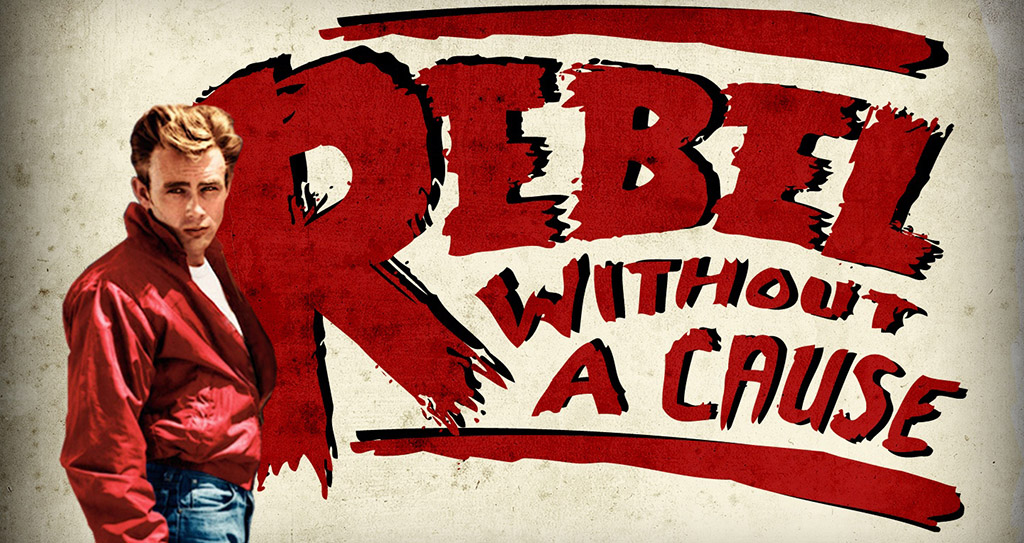
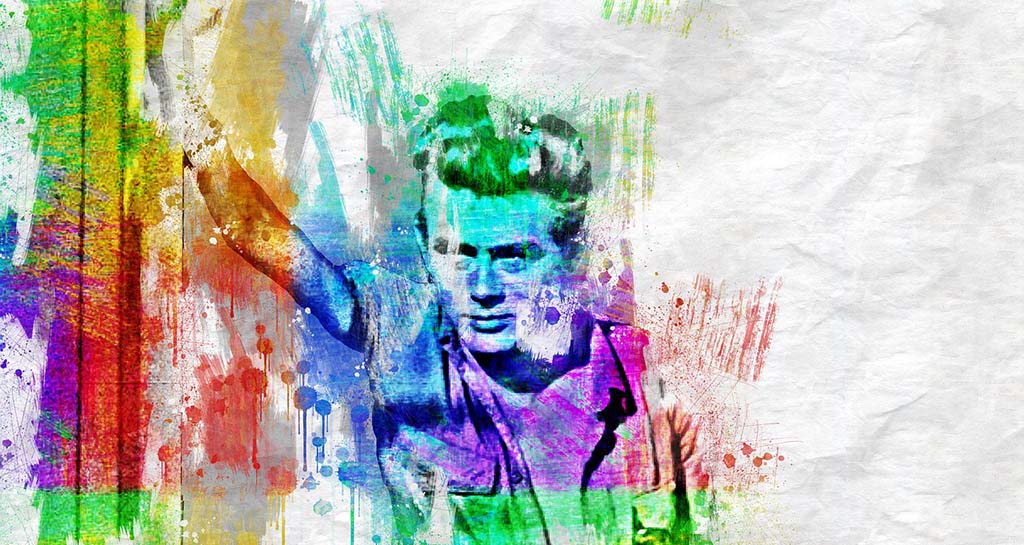
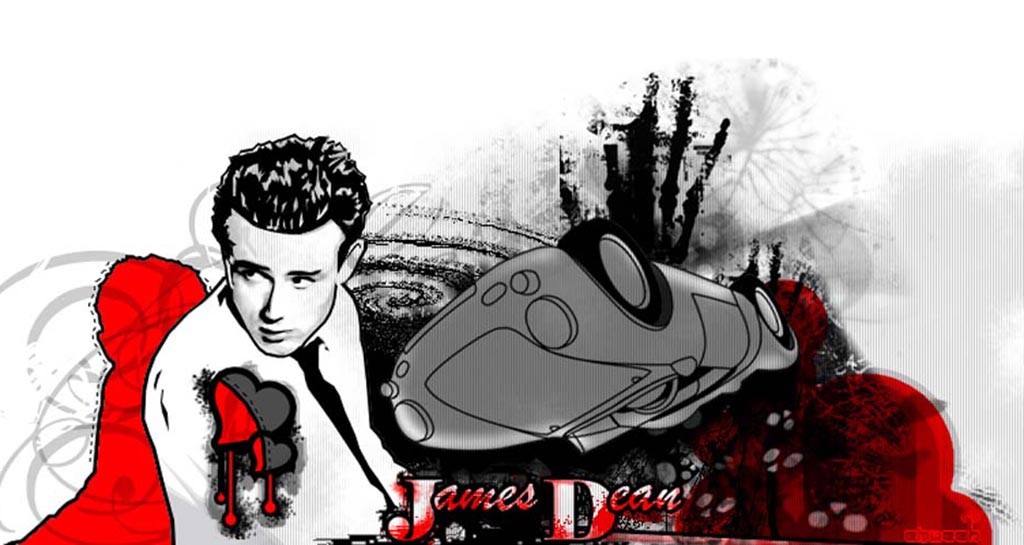

 Вход на сайт
Вход на сайт